Breastsleeping: Breastfeeding and Co-Sleeping
In this article, you'll learn about the true meaning of breastsleeping and the relationship between co-sleeping and breastfeeding.

More and more families decide to sleep with their baby in the same bed or next to their crib so they can have their little one close to them and, thus, practice breastsleeping. Apart from the multiple benefits that co-sleeping offers, it also prevents having to get up at night every time your baby wakes up, so parents are able to get more sleep at night and better quality rest. With that in mind, we want to tell you more about the relationships between breastfeeding and co-sleeping.
The concept of breastsleeping
The term breastsleeping was born thanks to researchers James McKenna and Jee Gettler, anthropologists and experts in human behavior. This is the nickname they chose to refer to the close union between co-sleeping and breastfeeding.

Co-sleeping benefits
First, we should mention beforehand that co-sleeping has an infinity of benefits, as this study published in Primary Care Pediatrics shows, both for the mother and for the baby. The most notable benefits would be the following:
- Promotes breastfeeding: Co-sleeping facilitates night feedings, making the mother’s rest compatible with breastfeeding.
- The whole family sleeps better: Not only because they don’t have to get up to tend to the baby, but also because the little one will have fewer awakenings and will fall asleep better when feeling accompanied by their parents.
- Reduces the risk of sudden death: Studies show that co-sleeping reduces the risk of sudden death in infants.
- It promotes the well-being of the baby and their emotional and neural development.
How does co-sleeping favor breastfeeding?
Sleeping with your baby at your side encourages them to take more nightly feedings, which wouldn’t be the case if they slept apart from you. Having the breast at their free disposal means that they can suck when they feel the need without even having to ask.
All this means that the production of the mother’s milk is maintained during the night and that she doesn’t wake up with such a congested breast.
In addition, having the mother’s breast fully available during the night helps the child to fall asleep after the micro-arousals that they have during the night. This is achieved thanks to the hormones contained in milk and the security and tranquility that being close to their mother gives them.
Studies show that babies who sleep with their mothers will breastfeed longer than those who didn’t sleep with their parents.
Precautions when practicing breastsleeping

If you decide to combine breastfeeding and co-sleeping because of all the benefits that this practice has, you have to take into account a series of factors so that breastsleeping is safe :
- Don’t use pillows, blankets, or any other item near the baby: Your little one should sleep on a firm mattress that’s free of any cushion, blanket, or stuffed animal. If it’s cold, you can put a sheet up to her waist but no other objects can be close to their face.
- Do not sleep with the baby on sofas, rocking chairs, or chairs: Whenever you sleep with your little one, it must be in bed, on a flat surface where the baby is on the mattress. If you sleep with them on the sofa, there’s a risk that they may fall off during sleep. The spaces between couch cushions also pose a suffocation risk.
- Don’t smoke, drink alcohol, or take other substances: If the mother or partner has used alcohol or drugs, they can fall into such a deep sleep that they don’t even realize that the baby’s there. With carelessness, they could end up crushing the baby.
- Obesity: If either the mother or father is obese, there may be a real risk of crushing. Also, the weight of the adult can cause the mattress to sag more on that side, which could cause the baby to slide to that side.
- Premature or low birth weight babies: Each situation should always be assessed by a professional, but, as a general recommendation, co-sleeping should not be done with premature babies.
To finish, after telling you about the many benefits that combining breastfeeding and co-sleeping provides, you’ll surely consider this option if your idea is to breastfeed your baby. But remember, each family and their circumstances are completely different. In the end, whatever you decide, it will be the best for your family. There’s no one better than you to know your own needs and those of your baby.
